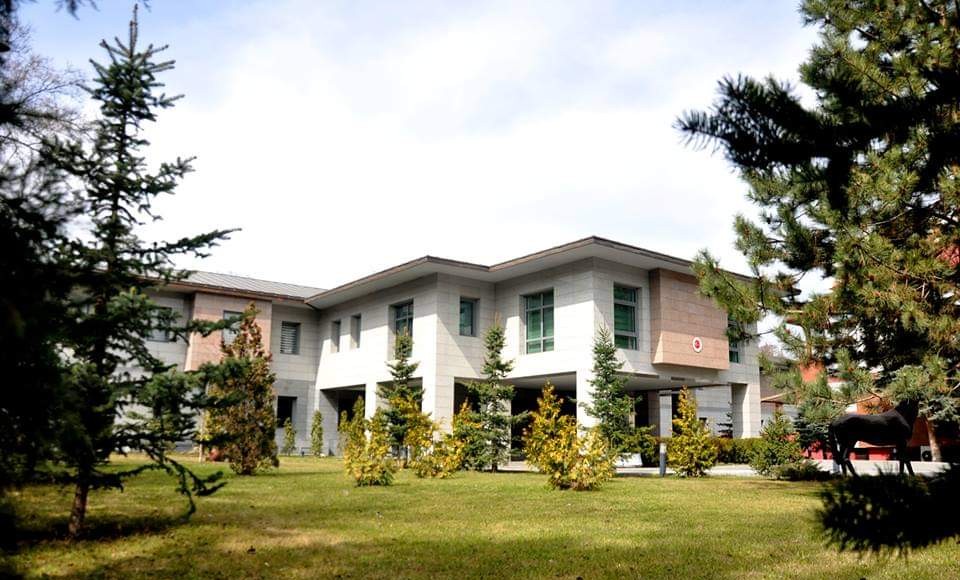Kyrgyz authorities have no right to carry out a search of Turkey’s diplomatic premises in Bishkek for educator Orhan İnandı, who is allegedly being held against his will in the Turkish Embassy, Deputy Interior Minister Nurbek Abdiev said in a parliamentary hearing held on Wednesday, the Stockholm Center for Freedom reported, citing the 24.kg news agency.
İnandı had not crossed the country’s borders since his disappearance, Abdiev told Kyrgyz lawmakers.
İnandı, the founder and president of the Turkish-Kyrgyz Sapat school network operating in Kyrgyzstan, went missing in Bishkek on the evening of May 31 and is feared to have been abducted by Turkey’s National Intelligence Organization due to his alleged links to the Gülen movement, a faith-based group inspired by Muslim cleric Fethullah Gülen.
According to Abdiev, Kyrgyzstan had previously denied an extradition request from Turkey for İnandı, which was conveyed through diplomatic channels in 2018.
Kyrgyz President Sadyr Japarov earlier ordered the State Committee for National Security and the Interior Ministry to conduct an extensive search to locate İnandı.
İnandı’s wife, Reyhan İnandı, said in a June 6 statement that an undisclosed source told her that her husband was being held against his will at the Turkish Embassy, and she claimed he was being tortured to renounce his Kyrgyz citizenship. This would simplify İnandı’s forcible transfer to Turkey, she said.
Taalaygul Toktakunova, the attorney for the family of İnandı, shared records from a dashcam from İnandı’s car showing suspicious individuals who could have been involved in his disappearance, which occurred right after a meeting with a former minister who took a trip outside Kyrgyzstan soon after İnandı went missing.
Kyrgyz citizens, politicians and NGOs continue calling on the country’s authorities to take all possible steps to ensure İnandı’s safety.
Since June 1 protests have taken place in Berlin, London, Oslo and Brussels as well as Bishkek in support of the Turkish educator, demanding his release. The United Nations Human Rights Committee has called on Turkey to promptly take all measures necessary to establish the whereabouts of İnandı and said the government should ensure that İnandı would not be subjected to torture and inhuman treatment, guarantee his physical and mental integrity and immediately place him under the protection of the law.
Rights organizations have also asked Kyrgyz authorities to exert efforts for the release of İnandı. Human Rights Watch (HRW) called on Kyrgyz authorities to investigate the disappearance of İnandı and “ensure his safety and that he is not unlawfully removed to Turkey.”
The Human Rights Foundation urged Kyrgyz President Japarov to demand İnandı’s release and to “prevent his potential deportation under international law’s non-refoulement principle.”
Turkish intelligence has intensified its efforts to target dissidents abroad. Most recently a nephew living in Kenya of Gülen was abducted by Turkish spies and brought back to Turkey at the weekend, according to the state-run Anadolu news agency.
Turkish President Recep Tayyip Erdoğan has been targeting followers of the Gülen movement, inspired by US-based Turkish Muslim cleric Fethullah Gülen, since the corruption investigations of December 17-25, 2013, which implicated then-Prime Minister Erdoğan, his family members and his inner circle.
Dismissing the investigations as a Gülenist coup and conspiracy against his government, Erdoğan designated the movement as a terrorist organization and began to target its members. He intensified the crackdown on the movement following an abortive putsch on July 15, 2016 that he accused Gülen of masterminding. Gülen and the movement strongly deny involvement in the coup attempt or any terrorist activity.
In a joint letter UN rapporteurs accused the Turkish government of engaging in the systematic practice of state-sponsored extraterritorial abductions and forcible returns to Turkey, with at least 100 Turkish nationals from multiple states including Afghanistan, Albania, Azerbaijan, Afghanistan, Cambodia, Gabon, Kosovo, Kazakhstan, Lebanon and Pakistan removed to Turkey.
In a number of cases the UN Working Group on Arbitrary Detention (WGAD) concluded that the arrest, detention and forced transfer to Turkey of Turkish nationals were arbitrary and in violation of international human rights norms and standards.
A recent report by Freedom House on global transnational repression also revealed the intensity, geographic reach and suddenness of the Turkish government’s campaign targeting dissidents abroad, noting that Turkey has become number one among countries that have conducted renditions from host states since 2014.

